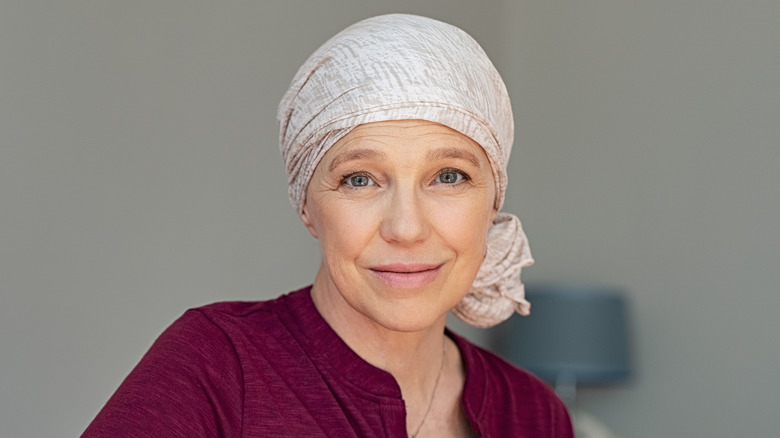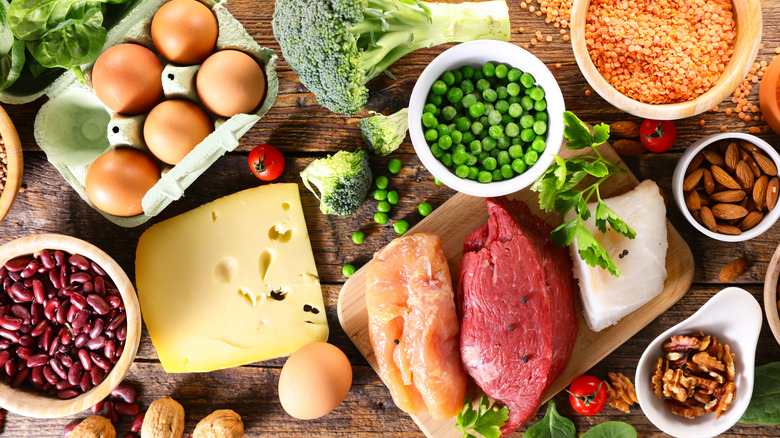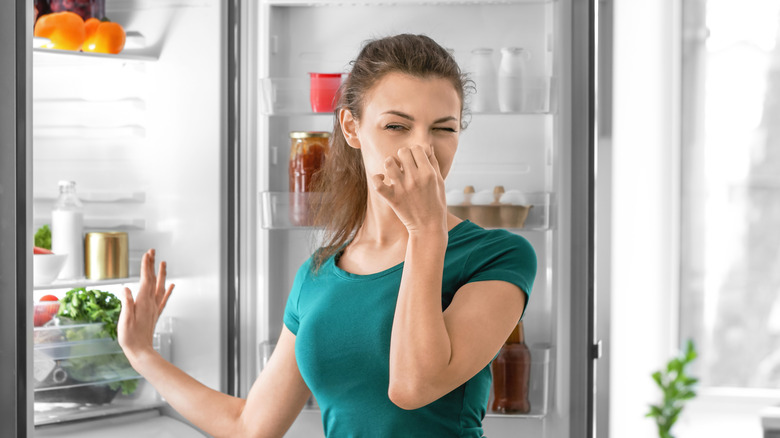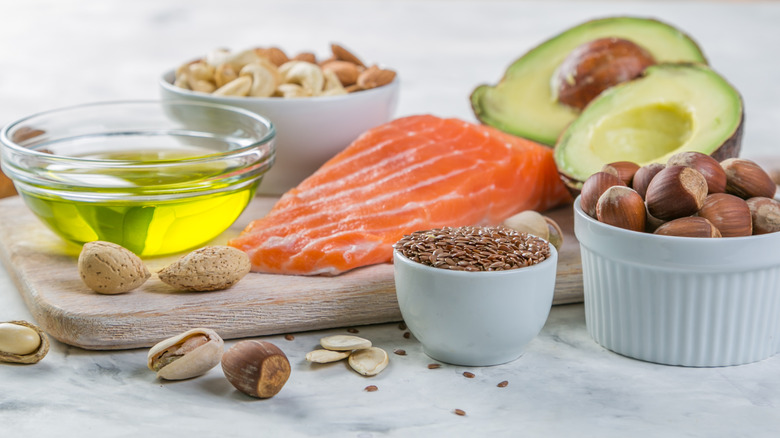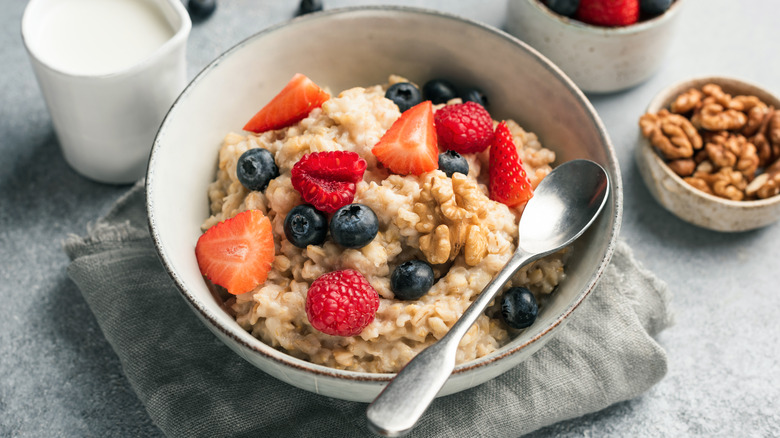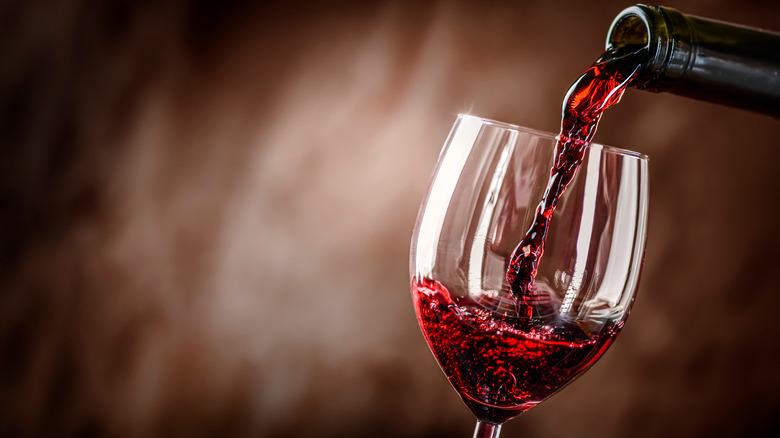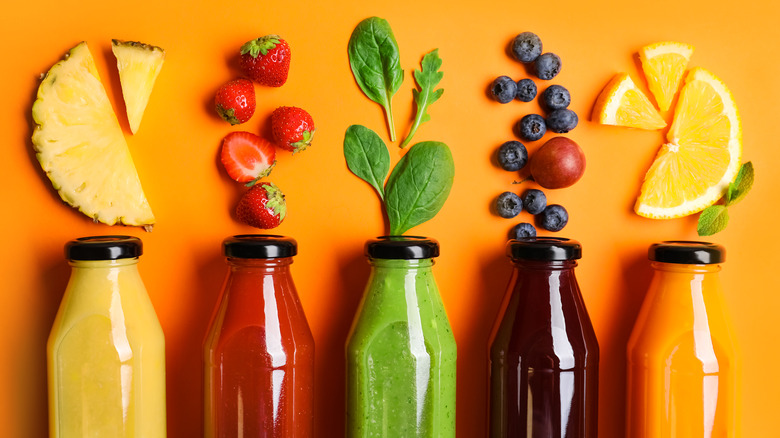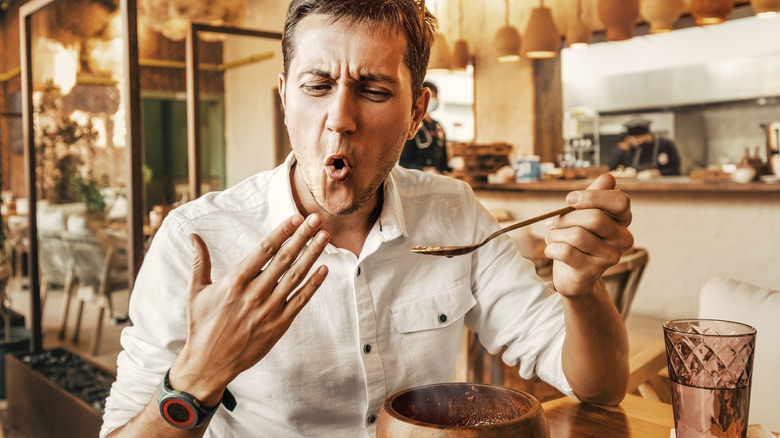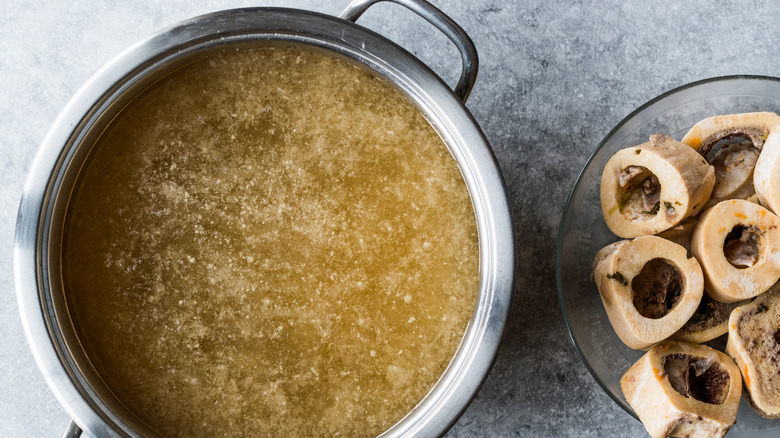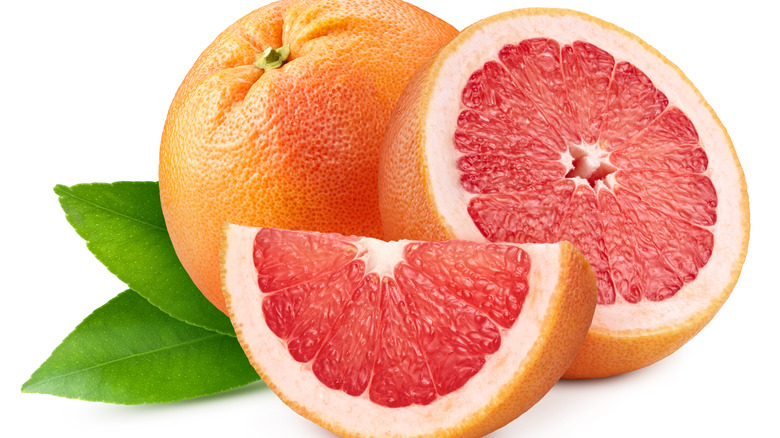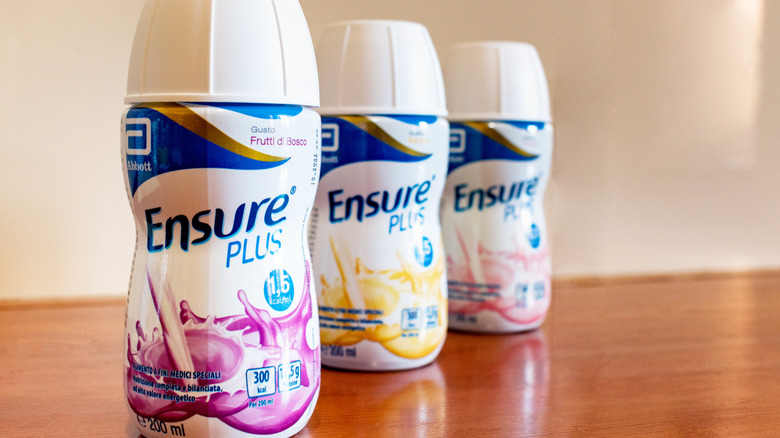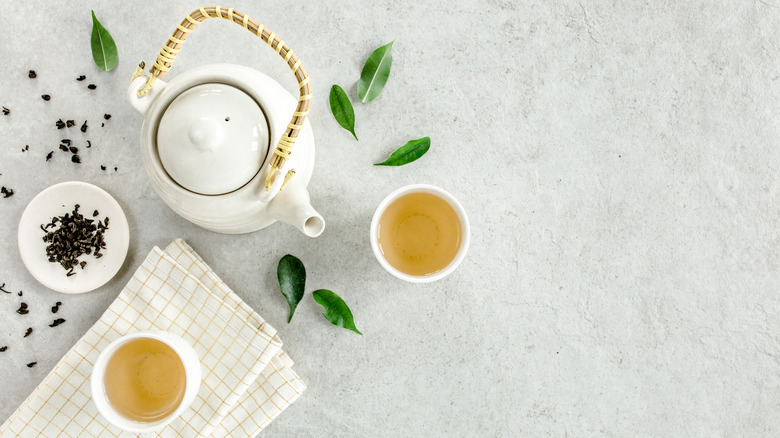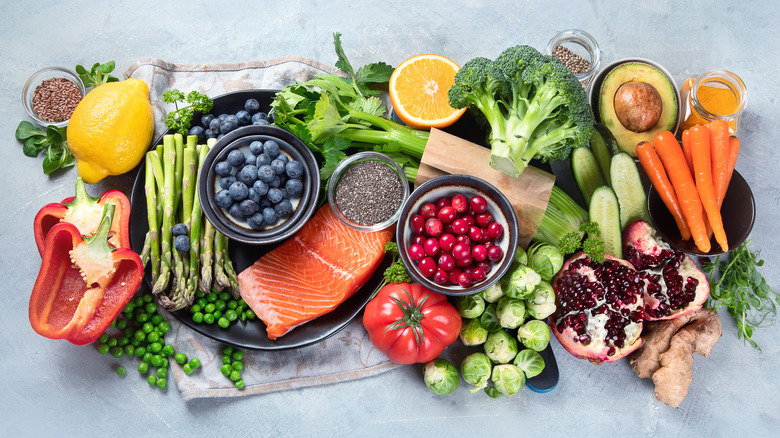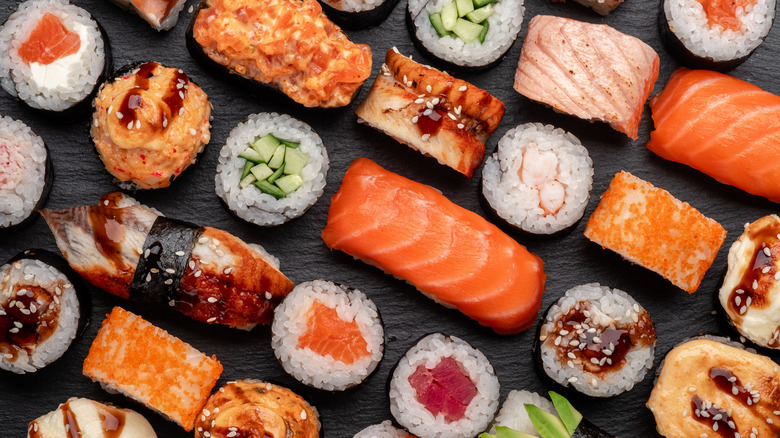7 Foods To Eat And 7 To Avoid When Going Through Chemotherapy
Proper nutrition is important at the best of times –– but it may be even more important when your body is fighting cancer. Eating a well-balanced diet can help alleviate treatment side effects, boost your energy, reduce inflammation, and preserve immune function (per Johns Hopkins Medicine). It can also help you maintain a healthy weight. While weight loss during chemo is a common concern, keep in mind that weight gain can also occur. Selvi Rajagopal, a specialist in internal medicine, explains via Johns Hopkins Medicine that "Treatment for breast cancer and blood cancers often involve steroids. Steroids can actually increase your appetite and increase your blood sugar levels, which might lead to insulin resistance and weight gain. So instead of losing weight, it's possible to gain quite a bit of weight from the combination of medications and a more sedentary lifestyle during cancer treatment."
The American Cancer Society describes some common side effects of chemotherapy that can impact your ability to eat. These include nausea, vomiting, constipation, diarrhea, mouth sores, and difficulty swallowing. To ensure adequate nutrition, many experts recommend eating light foods without strong flavors before treatment, such as yogurt with fruit, cereal with milk, or chicken soup. Afterward, you can try eating small meals and snacks throughout the day (via Stanford Health Care). You should also plan to drink plenty of fluids, along with taking anti-nausea medications as prescribed. Below, we'll discuss some foods to eat and some to avoid when going through chemotherapy.
Eat: Extra protein
While eating enough protein is considered essential to just about everyone's health, people going through chemotherapy may require even more protein than usual. Adequate protein can boost healing for cancer-damaged tissue and even stave off infection, according to the American Cancer Society. Generally speaking, you can calculate how much protein your body needs by dividing your weight (in pounds) by two (per OncoLink). The resulting number is how many grams of protein you should aim for daily. If you are undergoing chemotherapy, however, we recommend asking your doctor about increased protein needs.
The good news is that if you're looking to bump up your protein uptake, there are many potential sources to choose from. Johns Hopkins Medicine explains that plant-based proteins, which contain high levels of vitamins and minerals, are an excellent option to eat during chemotherapy. Plant-based proteins include beans, legumes, nuts, seeds, and soy products. You can also select animal protein sources such as fish or chicken. If none of those items sounds appealing, consider taking protein supplements (per the Mayo Clinic).
Avoid: Foods with strong aromas
Chemo can cause temporary changes in taste and smell, which can have the disconcerting effect of making foods that you've always loved suddenly seem nauseating (via Cancer Treatment Centers of America). Breastcancer.org provides expert tips on how to adjust your eating habits to account for these changes while going through chemotherapy. To start, choose bland, nutrient-rich foods such as nuts and nut butters; unsalted varieties are best. If your food tastes metallic, consider using non-metal utensils. Don't be afraid to experiment with different foods and flavors to learn what most appeals to you during treatment. Cara Anselmo, a clinical dietitian at Memorial Sloan-Kettering Cancer Center, tells WebMD that water and meat commonly become unpalatable during chemo.
Keep in mind that cool foods generally give off less aroma than warm ones –– so instead of serving your food piping hot, turn down the temperature a notch (via Self). Place ice into your drinks, blend up cold smoothies for meals or snacks, and chill food on your plate in the refrigerator or freezer prior to eating it. Note that cold food can also help numb your taste buds, making unappealing flavors less bothersome.
Eat: Healthy fats
While dietary fat sometimes gets a bad rap, the truth is that healthy fats can provide an important source of calories for anyone going through chemotherapy treatment. Your diet probably includes both saturated fats (animal-based, remain solid at room temperature) and unsaturated fats (usually derived from plants). While most individuals should aim to keep their saturated fat intake down to 5-6% of their overall calories (per the American Heart Association), people going through chemo may benefit from adding more fat to their diet. Although your doctor may determine that eating more saturated fat is okay for now, the majority of your fat intake should come from unsaturated fat sources (per Verywell Health).
Instead of turning to saturated fat sources like butter, cheese, red meat, and tropical oils, Medical News Today recommends healthy fats such as nuts, seeds, nut butters, olive oil, avocados, and some dairy products. These foods can provide additional energy if you're struggling to eat while on chemo. It is generally considered a good idea to avoid trans fatty acids entirely, which are most often found in highly processed foods (per GoodRx Health).
If you're unsure whether you should eat more fat during treatment, talk to your doctor or a registered dietician who specializes in working with cancer patients. They can assess your overall nutritional intake and determine what is best for your individual situation.
Avoid: Sharp or spicy foods
If you're going through chemo, you may want to take a pass on the chips and salsa for a while –– not to mention your favorite spicy Thai takeout. Even go-to comfort foods like crispy toast or crunchy crackers can be unpleasant to eat when your mouth is feeling sore and sensitive as a side effect of your treatment (per the Mayo Clinic). Instead, most experts recommend eating soft, bland foods during chemotherapy. This approach can help alleviate painful mouth sores, a common side effect of chemo.
Treatment-related mouth sores, also known as oral mucositis, can develop during chemo inside of the mouth, on the lips, and even in the esophagus. They can be extremely painful, impacting your ability to eat and swallow. If you are struggling with mouth sores during chemo, we recommend consulting your doctor. You may benefit from taking medications to minimize pain. Along with staying away from sharp and spicy foods, you should also avoid acidic foods, alcohol, and hot foods (via WebMD). These items can further irritate a sore mouth. Additionally, WebMD recommends keeping your mouth moist with plenty of fluids, as well as rinsing with salt water after you eat.
Eat: Carbohydrates
Carbohydrates provide your body with energy, something that people going through chemo tend to be short on. In part, this may be because cancer cells use a lot more energy than healthy cells, according to Cancer Connect. In fact, one potential line of cancer treatment could involve closely managing blood sugar levels to avoid glucose spikes, which further feed cancer cells. But before rushing to make any dietary changes, discuss your plans with your doctor. It is important to understand that your body needs healthy carbs to function properly –– even at the best of times. Fortunately, healthy carb sources are easy to find and come in many forms, including whole grains (i.e. quinoa and buckwheat) and fruits and vegetables (bananas, sweet potatoes, and apples), according to Healthline.
Along those lines, Healthline especially recommends eating oatmeal during chemotherapy. Not only is oatmeal an excellent source of carbohydrates, it also provides protein, healthy fat, and antioxidants. Oatmeal also has a mild flavor and soft texture, making it relatively easy to eat if you're suffering from treatment side effects like mouth sores, nausea, or difficulty swallowing. It also goes really well with fresh fruit. Delish provides a wide range of easy oatmeal recipes, with comforting flavors like pumpkin spice, cinnamon roll, caramel apple pie, and strawberries and cream.
Avoid: Alcohol
Drinking alcohol during chemo is generally not recommended (via Verywell Health). However, risks can vary between patients. If you would like to drink alcohol during chemotherapy treatment, talk to your doctor about whether this is safe for you. There are several important issues to consider: Alcohol can interact with some types of chemo drugs, as well as with medications for pain, anxiety, and nausea that are commonly taken by cancer patients. Alcohol can also have a negative impact on chemo side effects, making issues like dehydration, mouth sores, nausea, and vomiting even worse. Finally, heavy alcohol use during chemo can lead to additional problems like low blood counts, sleep disruption, and even depression.
Assuming major drug interactions have been ruled out, moderate alcohol use during chemo is unlikely to have any major effect (per Healthline). According to the Mayo Clinic, moderate alcohol use means no more than one drink per day for women, and no more than two drinks per day for men.
Eat (well, drink): Smoothies
Some people going through chemotherapy find that drinking meals is easier than eating them (via WebMD). Plus, smoothies are a great way to get in your daily servings of fruits and vegetables, along with plenty of calories and nutrition. They are also cold –– which can really help soothe a sore mouth or throat from treatment side effects.
WebMD offers a number of "smoothie tips for people with cancer." First, they suggest adding fruit, which acts as a natural sweetener and provides fiber and antioxidants. Potassium-rich bananas and avocado are two great add-ins, though you may wish to avoid fruits with seeds (like strawberries) if your mouth hurts. You can also blend in leafy greens like spinach, kale, or romaine, along with other vegetables. Next, add a protein source like yogurt, nut butter, or protein powder. Finally, you'll need a liquid base. Suggestions include coconut water (good for replacing electrolytes), low-fat milk, your favorite plant-based milk, or filtered water. Here's one healthy smoothie recipe from WebMD: Blend 2 cups frozen unsweetened blueberries, ½ cup calcium-fortified orange juice, ¾ cup low-fat or nonfat vanilla yogurt, ½ medium frozen banana, and ½ teaspoon pure vanilla extract. Yum!
Looking for more ideas? The Cleveland Clinic suggests using fruit juice to boost calories and provide more flavor, along with adding healthy fats like chia seeds, coconut oil, or olive oil. You can even blend in a scoop of ice cream! And if you're feeling nauseated, try mixing in some fresh mint, grated ginger, or lemon zest.
Avoid very hot or very cold foods
Some experts, including those at Breastcancer.org, recommend avoiding very hot or very cold foods when going through chemotherapy. To start, very hot foods can aggravate pain associated with mouth sores, a common chemo side effect (per the Mayo Clinic). If you are suffering from mouth sores, try eating your food at room temperature or slightly warmer or cooler. And if you're struggling to find foods that are palatable in this temperature range, consider some of the Mayo Clinic's high-protein food suggestions which include cottage cheese, chicken salad, cold salmon, and sandwiches with lunch meat.
Since cold foods can be soothing to sore mouths and throats, you may be tempted to reach into your freezer for sustenance. Before breaking out the popsicles, however, talk to your doctor. Some chemo drugs cause cold intolerance (per Breastcancer.org). Whether or not this applies to you, always keep in mind that receiving adequate nutrition is an important part of your cancer journey. Your doctor may be able to prescribe numbing agents and other pain medications that can help you eat more comfortably.
Eat: Broth and broth-based soups
Not only is broth comforting when you're not feeling well, it is also extremely nutritious and hydrating. Many people specifically tout the healing power of bone broth, which is said to boost immunity, reduce inflammation, and improve digestive health (per Psychology Today). But L.J. Amaral, a clinical dietitian in the Samuel Oschin Comprehensive Cancer Institute Patient and Family Support Program, explains to Cedars Sinai that there's no need to select bone broth (currently trending) over other types of broth: "I will recommend broths for people who are experiencing electrolyte imbalances, especially after vomiting, diarrhea, or excessive sweating. For people on liquid diets, bone broth may make them feel like they're getting a little bit more variety, even though it's essentially the same thing as other kinds of broths."
The Healthy Cooking Blog shares a Chicken, Barley and Bow Tie Soup recipe from Holly Clegg's book "Eating Well Through Cancer: Easy Recipes & Tips to Guide You Through Treatment and Cancer Prevention." It includes chicken broth, lots of vegetables, rotisserie chicken, and pearl barley. Or, you can make Cancer Support Community's Ginger Turkey and Wild Rice Soup, which consists of chicken broth, diced or shredded turkey breast, fresh vegetables, and wild rice. Whether you opt for regular broth, bone broth, or a broth-based soup, watch your sodium intake and let it cool adequately before eating.
Avoid: Grapefruit and grapefruit juice
If you are going through chemotherapy, you may need to avoid grapefruit and grapefruit juice for a while. "Grapefruit juice can slow down the breakdown of some drugs, so you can build up toxic levels. For patients with cancer, there are some contraindications with chemotherapy drugs that you have to watch out for," explains Anthony Perre, Chief of the Division of Outpatient Medicine at Cancer Treatment Centers of America (CTCA). When chemo (or other) drugs fail to break down, you may be at risk for developing additional health issues like muscle damage or heart arrhythmia.
Since drug interactions can vary between patients based on a number of factors, you should check with your doctor if you'd like to include grapefruit or grapefruit juice in your diet. However, be aware: Breastcancer.org states that due to the large number of possible drug interactions (at least 85, according to a 2013 review in the Canadian Medical Association Journal), it may be best to avoid grapefruit or grapefruit entirely during chemo.
Eat: Meal replacements when needed
If you're having trouble eating regular food, products like Ensure or Boost can pack in a lot of nutrition in just a few sips. In fact, meal replacement shakes offer many benefits for people going through chemotherapy. These products are convenient, taste good, and can help prevent malnutrition, according to Max Health Living. Their site provides a list of the "best meal replacement shakes for cancer patients," including Nutricia Fortisip, Orgain Organic, and Boost Optimum.
Rachel Dudley, a registered dietitian at the Dan L. Duncan Comprehensive Cancer Center in Houston, told Livestrong that a supplemental beverage should contain at least 250 calories and 15 grams of protein. Most commonly, patients turn to Ensure or Boost brands for ready-to-drink products. She explains, "Both products come in several varieties and different flavors that would be suitable for people undergoing cancer treatment." Along with being used as meal replacements during cancer treatment, you can also drink them for energy-boosting snacks or even as a sweet, nutritious dessert (per Ensure).
Avoid: Green tea (for some patients)
You probably already know how soothing a warm cup of green tea can be. While you should always turn to your doctor for individual recommendations, green tea is generally considered safe in moderation (one to two cups per day), per Breastcancer.org. We also want you to know that people going through chemotherapy should avoid taking highly concentrated green tea supplements.
Unfortunately, some individuals may need to avoid green tea altogether during chemotherapy. The effectiveness of some chemo drugs (including Velcade, also known as bortezomib) may be impacted by even small amounts of green tea. And according to Mount Sinai, research indicates that both green and black tea extracts may cause reduced sensitivity to chemotherapy drugs in prostate cancer patients.
On the plus side, there is emerging evidence that green tea may help ease chemo symptoms and improve the effectiveness of certain chemo drugs. A 2016 research review in Nutrients concluded that "the combination of green tea and anticancer drugs may be important in enhancing therapeutic efficacy while diminishing negative side effects." Green tea may also play a role in cancer prevention, but more research is needed before researchers can draw solid conclusions.
Eat: As nutritiously as you can
While it is clearly important to eat as nutritiously as possible during chemo, we also don't want you to feel bad if your nutritional intake isn't perfect. After all, the side effects of treatment may make this extremely challenging on some days. On others, you may discover that your appetite is best first thing in the morning (or later in the day), but you don't feel like eating anything at all during other times. What's most important is to figure out what works best for you.
You may wish to make preparations before starting chemotherapy treatment. The National Cancer Institute offers a helpful digital guide called Eating Hints: Before, during, and after Cancer Treatment. It suggests filling your fridge, freezer, and pantry with healthy items, stocking up on easy-to-prepare foods, preparing and freezing individual portions of home-cooked meals, and asking your friends and family for help with food prep and shopping when you're not feeling well.
Other helpful tips on eating during chemotherapy include boosting flavorless foods with sauces and other toppings, trying plant-based proteins if meat begins to taste bad to you, visiting your dentist regularly to ensure proper oral hygiene, and experimenting with a variety of flavors, textures, and temperatures to learn what is most palatable to you (via the Mayo Clinic). Finally, make sure to talk to your doctor if you are struggling. They can refer you to a nutritionist who specializes in working with cancer patients.
Avoid: Raw and undercooked foods
In case you get a sudden sushi craving or are confronted with a cheese platter during chemo, we want you to know that you should not eat raw and undercooked foods (per Verywell Health). For now, be sure to pass on raw fish and seafood, moldy cheeses like blue cheese and Roquefort, unpasteurized dairy products, any type of runny eggs, raw nuts, and undercooked meat. This is because raw and undercooked foods can contain harmful bacteria, something that healthy white blood cells can usually deal with. During chemo, however, these foods have the potential to make you seriously sick –– and that's about the last thing you need while you're going through cancer treatment.
To avoid food-borne infection, you should also avoid eating food past its expiration date, leaving animal proteins sitting out to thaw, eating leftovers that have been in the fridge for more than three days, and going to self-serve buffet-style restaurants (per the National Cancer Institute). Maintaining proper hand hygiene and kitchen cleanliness is also advised for chemo patients and their caregivers.

